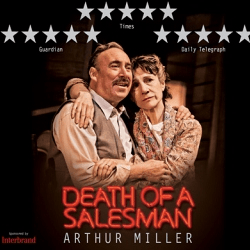Review of Death of Salesman
 Anthony Sher in DEATH OF A SALESMAN at the Noel Coward Theatre. The first thing you should know if you’re considering buying a ticket to see Sir Anthony Sher in the Royal Shakespeare Company’s production of DEATH OF A SALESMAN, written by Arthur Miller in 1949, is that you’ll be watching one of the greatest plays ever created.
Anthony Sher in DEATH OF A SALESMAN at the Noel Coward Theatre. The first thing you should know if you’re considering buying a ticket to see Sir Anthony Sher in the Royal Shakespeare Company’s production of DEATH OF A SALESMAN, written by Arthur Miller in 1949, is that you’ll be watching one of the greatest plays ever created.
Regarded by many as the American KING LEAR it contains all the drama, heartbreak and poignancy of Shakespeare’s greatest tragedy whilst dramatising, not the disintegration of a magnificent monarch but, as the title suggests, the last days of a humble travelling salesmen, Willy Loman.
When the curtain goes up we meet him exhausted by a lifetime in the profession and prone to dosing off at the wheel. He returns home to his wife unexpectedly when he simply cannot face one more trip to Boston, where his network of friendships and business contacts have been superseded by a new generation with whom he struggles to connect.
The first thing you should know if you’re considering buying a ticket to see Sir Anthony Sher in the Royal Shakespeare Company’s production of DEATH OF A SALESMAN, written by Arthur Miller in 1949, is that you’ll be watching one of the greatest plays ever created.
Over the next few hours we watch his mind begin to unravel through a series of tragic encounters and flashbacks that reveal his early faith in the American Dream that insists anyone can succeed in life. The dream, as we know from countless plays and musicals since, is a big fat lie and for our salesman and his son the consequence is mental breakdown and financial devastation.
Stephen Brimson Lewis’s beautiful set shows a cross section of the Loman’s house. Downstairs we can see into the kitchen, stairwell and master bedroom, whiles upstairs we can see the bedroom of the family's two grown up sons who have retreated to their childhood room after a series of poor life choices. The youngest, nick name Happy, is a womaniser in a poorly paid job and the eldest, nick named Biff, has been unable to settle to anything since he failed to fulfill early promise as a baseball player.
Surrounding the house is a shimmering, reflective floor upon which the structure appears to float. This is the area that represents memory and is where the flashbacks are mostly played out. During the course of the action we see pivotal moments in which the salesman and his son pin too many hopes on dreams of success. This forestage is also the location for some of the plays most devastating scenes in which the father experiences a series of humiliations that force him to conclude that his life has been a failure.
The production boasts a top notch cast. Anthony Sher, in the title role is one of the UK’s most celebrated, charismatic and skilled theatre actors and effortlessly rises to the challenge of creating this broken man and charting his downward spiral. He’s joined by two of his most successful past collaborators; Harriet Walter with whom he once starred in an acclaimed production of MACBETH and Alex Hassell with whom he recently starred in HENRY IV. Once again Walter plays wife to Sher and Hassell plays his son, following their appearance a few months ago in the Royal Shakespeare Company’s revival of Shakespeare’s HENRY IV in which they also played a sort of father and son with Sher as Falstaff and Hassell as Prince Hal.
All of these productions were directed by Sher’s real life partner the RSC’s Artistic Director, Greg Doran. This dream team’s history of collaboration is very apparent. Sher and Walters are completely believable as a married couple of many years and the hunky, handsome Hassell spars with and lays into Sher with the ease in which fractious fathers and sons so often clash.
It’s an unmissable evening then in which some of our finest actors give career defining performances led by a director at the top of his game. Sher particularly contributes a series of unforgettable scenes in which he gives full reign to every tick and stumble of an infuriating, uncomprehending loser who defies you to like him even as he breaks your heart with a downfall that awaits all of us who are, as the modern adage puts it, only three pay checks away from destitution.
You’re unlikely to see a better production of it than this one
It’s about broken dreams, about family conflict, the breakdown of communication in a marriage and the unbearable pressure of living up to your family’s expectations. As such the play remains a timeless masterpiece and you’re unlikely to see a better production of it than this one.
Latest News

 HERE THERE ARE BLUEBERRIES at Stratford East - First look images released
5 February 2026 at 15:35
HERE THERE ARE BLUEBERRIES at Stratford East - First look images released
5 February 2026 at 15:35

 UK premiere of STAGE KISS heading to London
5 February 2026 at 15:16
UK premiere of STAGE KISS heading to London
5 February 2026 at 15:16

 Review: ARCADIA at Old Vic
5 February 2026 at 11:33
Review: ARCADIA at Old Vic
5 February 2026 at 11:33

 Alex Kingston and Richard Schiff star in Michael Frayn's COPENHAGEN
5 February 2026 at 10:45
Alex Kingston and Richard Schiff star in Michael Frayn's COPENHAGEN
5 February 2026 at 10:45
